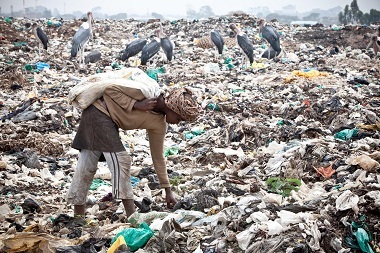Jun 23 2015
‘Progress for Children’ report highlights lessons from the MDGs
The global community will fail millions of children if it does not focus on the most disadvantaged in its new 15-year development roadmap, UNICEF warned today.

Kenya, June 2011. Shari (aged 13) collects rubbish at the dump in Korogocho slum, in order to survive and support her family and sick mother. © UNICEF/UKLA2011-03302/Schermbrucker
Progress for Children: Beyond Averages, UNICEF’s final report on the child-related Millennium Development Goals, says that, despite significant achievements, unequal opportunities have left millions of children living in poverty, dying before they turn five, without schooling and suffering chronic malnutrition.
“The MDGs helped the world realize tremendous progress for children – but they also showed us how many children we are leaving behind,” said UNICEF Executive Director Anthony Lake. “The lives and futures of the most disadvantaged children matter – not only for their own sake, but for the sake of their families, their communities and their societies.”
Disparities within countries have left children from the poorest households twice as likely to die before their fifth birthday and far less likely to achieve minimum reading standards than children from the richest households.
Continued failure to reach these children can have dramatic consequences. At current rates of progress, given projected population growth, it is estimated that:
- 68 million more children under five will die from mostly preventable causes by 2030;
- An estimated 119 million children will still be chronically malnourished in 2030;
- Half a billion people will still be defecating in the open, posing serious risks to children’s health in 2030;
- It will take almost 100 years for all girls from sub-Saharan Africa’s poorest families to complete their lower secondary education.
The report highlights notable successes since 1990:
- Under-five mortality dropped by more than half, from 90 per 1,000 live births to 43 per 1,000 live births;
- Underweight and chronic malnutrition among children under five decreased by 42 per cent and 41 per cent, respectively;
- Maternal mortality decreased by 45 per cent;
- Some 2.6 billion people gained access to improved drinking water sources.
And the gaps between the poorest and the wealthiest are narrowing in more than half of the indicators UNICEF analysed:
- In many countries, greater gains in child survival and school attendance are seen in the poorest households.
- The gap in maternal mortality rates between low- and high-income countries halved between 1990 and 2013, from 38 times higher to 19 times higher.
The report also highlights the bad news: Progress still eludes the nearly 6 million children who die every year before their fifth birthday, the 289,000 women who die every year while giving birth and the 58 million children who don’t go to primary school.
As world leaders prepare to adopt the Sustainable Development Goals, the most disadvantaged children should be at the heart of the new goals and targets, UNICEF said. Better data collection and disaggregation – going beyond averages such as those used to measure the MDGs – can help identify the most vulnerable and excluded children and where they live. Stronger local health, education and social protection systems can help more children to survive and thrive. And smarter investments tailored to the needs of the most vulnerable children can yield short and long-term benefits.
“The SDGs present an opportunity to apply the lessons we have learned and reach the children in greatest need – and shame on us if we don’t,” Lake said “For greater equity in opportunity for today’s children means less inequality and more global progress tomorrow.”